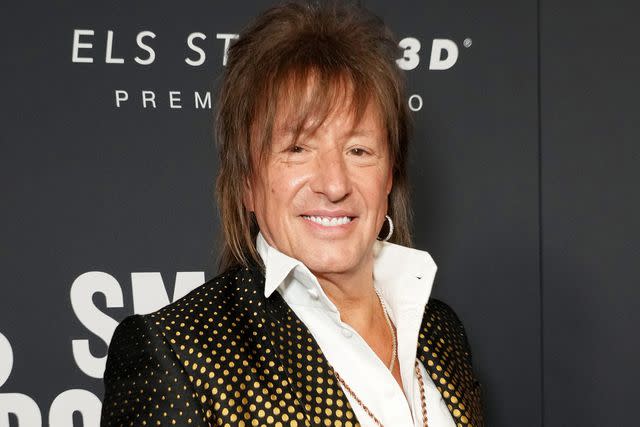Richie Sambora says he 'didn't receive a lot of compassion for what I was going through' before Bon Jovi exit
- Oops!Something went wrong.Please try again later.
- Oops!Something went wrong.Please try again later.
"I was in this organization 31 and a half years. Everybody has their personal tragedies and things like that," the band's former guitarist said.
Richie Sambora has revealed there was much more to his apology for abruptly leaving Bon Jovi than what was shown in new Hulu docuseries Thank You, Goodnight: The Bon Jovi Story.
The guitarist posted an Instagram video on Thursday that appears to be an extended, unedited clip of himself discussing his controversial decision to exit the band in 2013 that was filmed for the series. While the clip starts out with what appears in the final cut, Sambora goes on to note that he “didn’t receive a lot of compassion for what I was going through” prior to leaving the group.
“I was the guy that really fought for this to be a band. And, put it this way, there was a lot of motherf---ing things that were going on. A lot of said, done, fires back out of frustration, whatever. It's a band, you know? It's really, really hard to be married to four other guys and be in close quarters and that, the way we were,” he said. “That coupled with my daughter coming of age, my wife's mental health stuff was really acting up… she needed me and I needed her.”

Kevin Mazur/Getty
Richie SamboraThe “Wild in the Streets” rocker left Bon Jovi overnight when he chose not to return for the band’s Calgary stop on their 2013 sold-out Because We Can tour. While he initially cited personal issues as the reason for his disappearance, Sambora later told PEOPLE that the decision came from needing to prioritize his relationship with his daughter with ex-wife Heather Locklear, Ava.
“I don't regret leaving the situation, but I regret how I did it,” he clarified, which was shown in the final installment of the four-part documentary. “So I'd like to apologize fully right now to the fans especially, and also to the guys because my feet and my spirit were just not letting me walk out the door.”
Sambora, who checked into rehab in 2007 and 2011, said that his personal struggles weren't always taken in to consideration by the Bon Jovi machine.
“I’m not gonna go through [it] but, you can imagine, I was in this organization 31 and a half years. Everybody has their personal tragedies and things like that.… I didn't receive a lot of compassion coming back for what I was going through,” he explained. “I believe that everybody [has] their own respective perspective on how fame and fortune — everybody experiences that at different speeds. So that's how life can get whacked from one guy to the next level.”
What made Sambora’s departure even harder was that he was an “essential” member of Bon Jovi, having worked alongside frontman Jon Bon Jovi to pen and produce some of the band’s biggest hits over the years including "You Give Love a Bad Name," "Livin' on a Prayer," and "Wanted Dead or Alive."
“I spent more time with Jon than even his wife — and was more honest,” he said. “We spent a lot of time in a room with no windows just for the beginning stages of just writing the material, and then recording it, basically, the guys said we need to do basic tracks for a couple of weeks, and then it was Jon and I and the respective producer — whoever that was at that particular time.”
In addition to serving as a “co-producer,” writer, and performer on the band’s records, Sambora said that he was also vital because he was a fan of the band and could steer Bon Jovi in the right direction.
“I could be a fan of Jon and I go, ‘I don't want to hear you sing that.’ So I kind of wrote him from the song…like, ‘Yeah, this is what I would like to hear from you if I'm a fan in the audience’ and that kind of thing,” he explained. “I think that was one of the one of my primary roles, besides being his right hand and also an accurate mirror, so to speak.”
Bon Jovi reflected on Sambora’s apology in a recent Howard Stern interview, calling it the guitarist’s way of ending the speculation surrounding his departure once and for all.
"He came clean in the film for the fans, so I guess it would end all the speculation that there was ever a fight [in the group] or any of that stuff," the singer said. "Because — as I’d stated 1,000 times — that was not the case. Just not the case.”
Sign up for Entertainment Weekly's free daily newsletter to get breaking TV news, exclusive first looks, recaps, reviews, interviews with your favorite stars, and more.
Related content:
Jon Bon Jovi addresses son Jake's engagement to Millie Bobby Brown: 'I don't know if age matters'
Alec John Such, Bon Jovi bassist and founding member, dies at 70
Read the original article on Entertainment Weekly.

